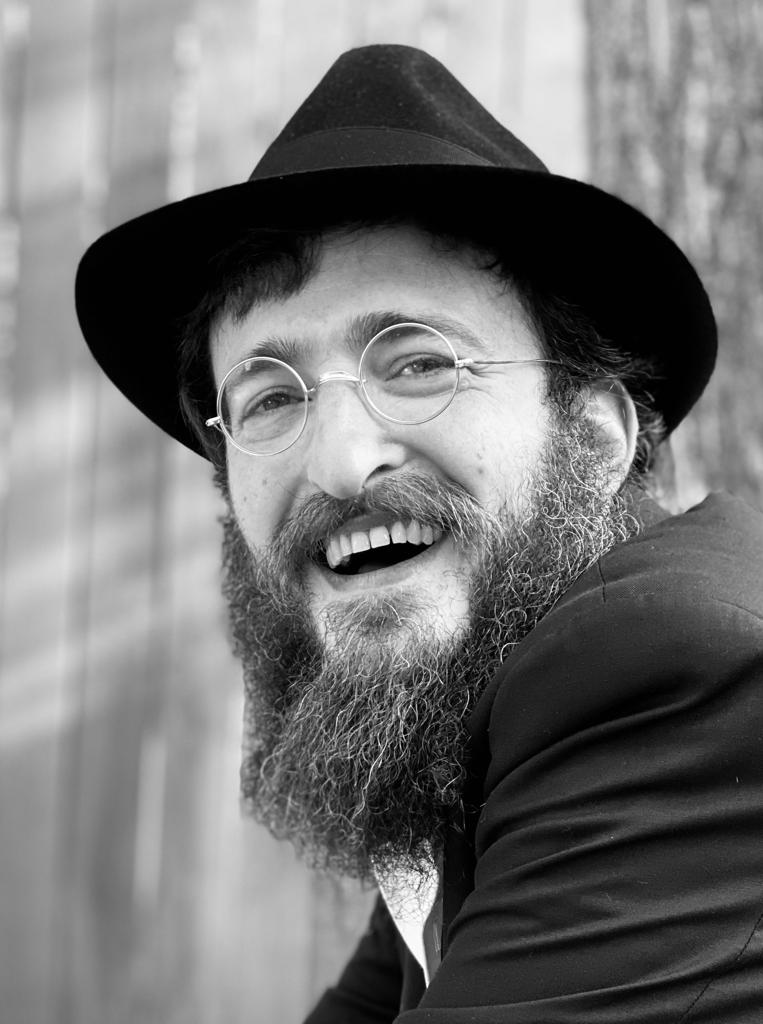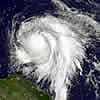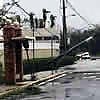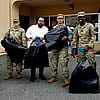A second hurricane is barreling through the Caribbean just weeks after Irma landed with force. Hurricane Maria, which on Monday destroyed much of the island nation of Dominica, is currently being classified as a Category 5 storm approaching St. Thomas, which is still reeling from Irma, and is set to strike on Wednesday right before Rosh Hashanah, the Jewish New Year.
Early Tuesday morning, the U.S. Coast Guard shut ports in San Juan, Puerto Rico, and in the Virgin Islands in preparation for Maria, which has already proven deadly.
Rabbi Asher Federman, co-director of Chabad-Lubavitch of the Virgin Islands, with his wife, Henya, is battening down whatever hatches are left. Although members of the Jewish community left before and after Irma, more than 100 are still there. In the past week, the rabbi has been in full recovery mode, assessing what needs to be done for residents who remain on St. Thomas and organizing aid to the beleaguered island, where many have been left homeless. While goods have gotten there—a flotilla of 25 vessels ferried crate upon crate of food staples and other critical supplies on Friday—a great deal remains stuck in transit.
So far, 1,000 kosher MREs (Meals Ready-to-Eat)—lightweight, nonperishable packaged meals used by the military—have arrived in the Virgin Islands, with another 1,400 on the way. They are currently in Puerto Rico, which forecasters now say will get the brunt of the coming storm, with winds at an incredible 160 mph. Some 5,000 items of clothing destined for St. Thomas now can’t leave Miami. Additional generators arranged by Federman, on their way from the U.S. Northeast to Miami, were set to sail for San Juan with other supplies on Wednesday, all of which is up in the air due to Maria’s impending arrival. Altogether, more than 100 pallets of aid from Chabad resources are frozen in transit.
“Things have reverted to secure-and-protect mode,” says Federman. “There’s a rush to get a hold of tarps and plywood, and protect whatever possessions are not covered yet.”

In Full Recovery Mode
As the Jewish New Year approaches on Wednesday evening, Federman and his team have been making holiday plans as well.
“If the storm shifts and misses us, then we will have services and a Rosh Hashanah meal at the Chabad House on Wednesday night,” he says. “If it does come here, we’ll still remain on the east end, where there’s a concentration of the Jewish community, at a secure building, and when it passes, we’ll be able to visit people and blow shofar for everyone in the area.”
On Monday morning, Dr. Adam Shapiro—an ear, nose and throat specialist with practices on St. Thomas and St. Croix—flew a small plane from Miami to St. Thomas to deliver extra supplies for Chabad, including items for Rosh Hashanah, such as apples, honey and pomegranates. Federman, with the assistance of Rabbi Mendel Galperin and rabbinical student Berel Dubinsky, has been delivering these holiday supplies to Jews across the island, along with the MREs and other necessities.
Each morning, the three men load up a well-used Toyota Sienna minivan with tarps, cleaning supplies, diapers, formula, kosher food and more, and begins their long trek around the decimated island. Getting fuel on the Virgin Islands hasn’t been easy, and they are frequently waylaid by popped tires—victims of the debris-covered roads. Still, with curfew pass in hand, Federman has successfully filled his days distributing desperately needed goods he has managed to have airlifted or boated to the island he has called home since 2005.

“We distributed all of our water today and ran out towards the end of the day,” says Federman. “That’s when we met a child asking for some. He didn’t want snacks or chips—just water.”
“The situation here is something you have to see for yourself with your own eyes to understand,” he adds. “People here need our help.”
In order to more easily serve all of the island’s inhabitants, the rabbis have been separating out vegetarians MREs, which they can give to Rastafarians who live on the island and do not eat meat. But meals are not only in demand in disadvantaged neighborhoods; everyone can use a good meal.
“They’re nutritious meals. Here, if you have no gas, you can’t eat, so it’s not about who is needy,” reports Federman.
Apples, Honey and MREs

Particularly poignant has been assistance that has come from Chabad Harvey Relief in Houston, which sent MREs, canned food and other nonperishables they received during Harvey, using cargo space donated by United Airlines on a flight from Houston to San Juan, Puerto Rico. That aid, along with other items sent from New York, has slowly been ferried to the Virgin Islands on boats skippered by members of the stricken island’s Jewish community. The rabbinical student, Dubinsky, arrived on the boat of Jewish community member Adam Israel last week with a number of generators he was able to procure in Puerto Rico.
“Whatever we’ve been able to get down here thus far has been a big relief for everyone we’re in touch with,” attests the rabbi.
Federman and others describe Virgin Islanders as members of a tightly-knit community, who, despite the destruction visited upon their beloved island, will rebuild. The same goes, he says, for the island’s Jewish community.

On a regular year, High Holiday services and activities draw mostly local Jews; not many tourists come during hurricane season. That is certainly the case this year.
Yet even if Maria does keep the Jews of the Virgin Islands physically apart, hunkering down on various parts of the island, some things will still unite them: They will dip apples into honey, they will stain their fingers peeling open pomegranates and picking out the seeds, and they will eat holiday meals consisting of kosher MREs consisting of meat or black beans.
Says Federman: “It’s the least we can do to kick off the new year.”
To assist in the effort, donate to Chabad of the Virgin Islands.











Start a Discussion